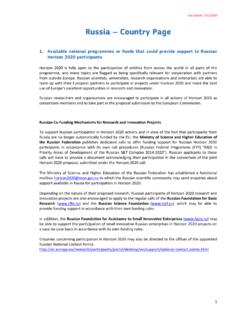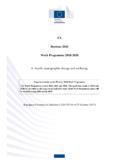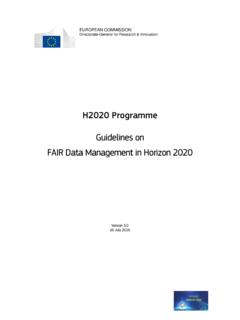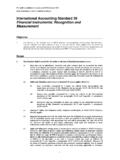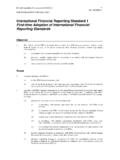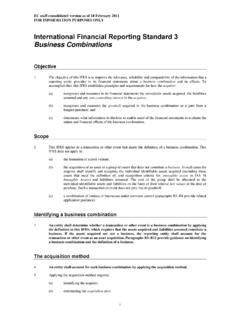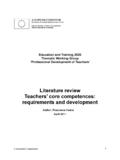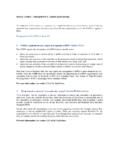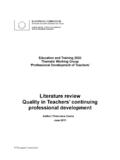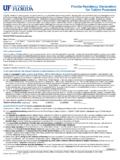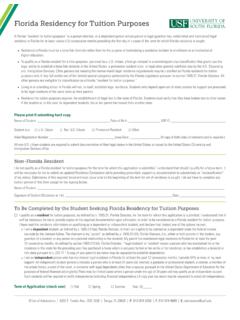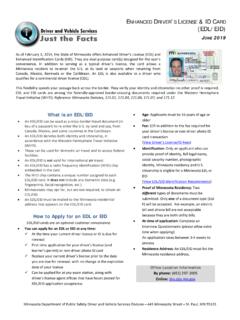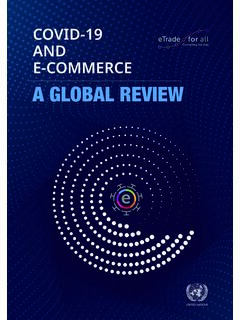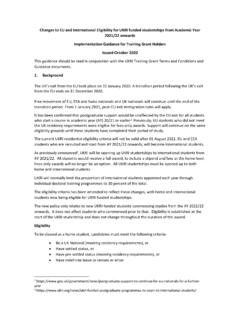Transcription of Frequently asked questions on measures adopted concerning ...
1 1 measures adopted concerning THE CLOSURE OF EU AIR SPACE Frequently asked questions AS OF 21 MARCH 2022 1. Is a non-Russian operator that operates a Russian registered aircraft affected by the measures ? Yes the measures prohibits flights of not just Russian air carriers, but also of all Russian registered aircraft, regardless of operator. 2. Does this ban concern also private ( non-commercial) flights of aircraft owned or rented by Russian citizens or Russian companies? Yes, also private aircraft are included in the ban. This means that also private business jets are banned. 3. Does this ban concern EU or third-country registered aircraft which are rented by Russian citizens? Yes. 4. Our company has been requested to provide a service but we are not sure whether it is covered by the new measures . What are our responsibilities? In case of doubt, you can always contact the competent authorities of the MSs or the European Commission.
2 But, it is important to keep in mind that Article 12 of Council Regulation (EU) No 833/2014, as amended by Council Regulation (EU) 2022/334, on 28 February 2022, states that it is prohibited to participate in activities the object or effect of which is to circumvent prohibitions in this Regulation. Moreover, companies are also recommended to report attempts of circumvention to the local authorities. Anyone can report sanctions violations to national authorities or the European Commission. 5. We have leased a non-Russian registered aircraft to a Russian operator. Can we fly the aircraft back from Russia? If the leasing contract is cancelled to the effect that the aircraft is no longer operated or controlled by a Russian entity, it is not covered by the EU Sanctions and may return to the EU without problems. It may also be returned under the exceptions provided for the Regulation with the specific and duly justified permission of the relevant Member State(s) even if the contract has not been cancelled.
3 6. How can we enforce the rules as regards non-Russian-registered aircraft which is owned or chartered, or otherwise controlled by any Russian natural or legal person, entity or body since we do not know about the parties behind an EU registered private aircraft? 2 It is correct that in particular for overflights, immediate control and enforcement will be difficult. However, the States should brief their ramp check personnel to pay particular attention to this regulation, when checking aircraft that have landed on their territory. In addition to checking documents, the crew should be asked questions about passengers etc. It should also be kept in mind, and communicated to stakeholders, that any entity that is found to have breached the sanctions or participated or assisted in circumventing them may face legal consequences. 7. Does the ban cover just Member States own airspace, or also high-seas airspace controlled by the said Member State.
4 The Regulation applies to the territory of the Union. High seas airspace is therefore not covered by the regulation. Only Member States own airspace is covered. 8. NOTAM text: We do not expect Russian Search & Rescue aircraft to operate in our airspace. Do we need to include this mention in the NOTAM? It is better that each State publishes an identical NOTAM, to avoid any confusion about whether the EU MS are acting in a coordinated manner, or whether some MS might have different rules. If there are no SAR flights in one States airspace, then this mention remains a dead letter, but at least it avoids confusion about having a common line in the EU. 9. What is the point of mentioning one-way returns? Is this not contradicting the legal text? The mention aims to facilitate the return flights for aircraft owned by the EU leasing companies. Once the leasing contract is terminated by the leasing company, the aircraft is no longer affected by the ban and may be flown back but States may also authorise a return in accordance with Article 3d(3) of Council Regulation (EU) No 833/2014, as amended by Council Regulation (EU) 2022/334, on 28 February 2022, even if the contract has not been terminated yet.
5 10. Do we need to specifically authorise also humanitarian or SAR flights, or does this requirement apply only to leased flights? The requirement for carrying a specific authorisation applies to all these flights. Otherwise an overflight might be able to circumvent the rules by simply claiming to be humanitarian flight. 11. Does the ban apply also in case of a person who is a dual citizen ( has both Russian and EU passports)? Yes, they remain citizens of Russia, even if they also hold a second passport from elsewhere. Article 3d: (1) It shall be prohibited for any aircraft operated by Russian air carriers, including as a marketing carrier in code-sharing or blocked-space arrangements, or for any Russian registered aircraft, or for any non-Russian-registered aircraft which is owned or chartered, or otherwise controlled by any Russian natural or legal person, entity or body, to land in, take off from or overfly the territory of the Union.
6 3 If a person holds RU passport (as well as any other passports /dual/multi citizenship), this person is to be treated as RU citizen for the purpose of Article 3d of this Regulation, for all cases of an ownership, chartering and control of aircraft, also when having the EU Member States residency . It is up to the national authorities/operators to assess whether the operation is in line with the Regulation. All stakeholders should bear in mind a liability for the circumvention of the prohibition as foreseen in Article 12 of the Regulation. 12. Do these restrictions apply to Russian citizens having a permanent stay permit within the EU Member State as well? Yes, they do. 13. Are repatriation flights carrying Russian citizens back to Russia allowed with aircraft that would be otherwise banned? Genuine repatriation flights could be considered in the context of the Regulation. measures to ensure that repatriation flights are genuine could be the following: The operator must demonstrate that the flight is genuinely a repatriation, and not just a regular scheduled flight that happens to have missed the start of the ban.
7 A plane flying in empty to pick up pax; Passengers should be identified by the local consulate; The plane must only carry Russian citizens and residents without return flight or connecting flight outside Russia; Authorities must check every pax to determine genuine repatriation; A flight with just a handful of pax on board could be an indication that the flight is not genuinely a repatriation flight; same goes for a flight operated by private or business jet; Repatriation flights usually take place soon after the event in question; additional checks may be required when this is not the case. Authorities should also consider that repatriation could also take place through other flight connections and other modes of transport. 14. Do these restrictions apply also to Russian citizens owning EU legal persons that registered the aircraft in the EU Member State? Yes they do. Please note the wording in Article 3d, which says or for any non-Russian-registered aircraft which is owned or chartered, or otherwise controlled by any Russian natural or legal person.
8 The intention of this wording is to avoid the possibility of circumventing the rules by some legal construct. 15. Do these restrictions apply also to an aircraft that has been in maintenance in the EU and would now return to Russia? Yes. A maintenance return flight would not qualify as a humanitarian flight or one that is compatible with the objectives of this Regulation. 16. What is the process to coordinate with the Network Manager for flights to which derogations are issued? 4 To ensure that the Network Manager can handle all information related to derogations, the following process should be used until further notice: 1. Operators need to seek derogation (including humanitarian1) from the competent authority of each State they wish to fly to/over/from. This is applicable for flights intended in any EU State, as well as for flights intended in any additional State that has banned flights via NOTAM. An overview of the NOTAMs issued for the Eurocontrol Network Manager (NM) area in relation to the Ukraine crisis can be found in the NM NOP portal 2.
9 Once all necessary approvals have been received, and minimum 1 hour before the flight plan is filed, contact the NM Operations Centre (NMOC) Operations Manager (OM) via email to inform of the flight for which the necessary authorisations have been received. Please include c/s, ADEP, ADES and EOBT in the email (to: cc: The NMOC OM will then ensure that the flight plan is not rejected by the NM system. 3. The flight plan must be filed with a remark: Authorisation received from ..(listing all the relevant/approving States within the NM area) 17. Can request for diplomatic flights be authorised? Yes. Authorisations for diplomatic flights would not be contrary to the objectives of the Regulation, so they could in principle be authorised. However, in order for this exception not to be abused such authorisation should be granted at the request of the State (MS or third State) organising the meeting, or the State of the seat of the international organisation ( CH for UN meetings in Geneva, FR for meetings of the Council of Europe in Strasbourg), and not of Russia itself.)
10 In this way, it will be possible to confirm the purpose, duration and other conditions of the diplomatic flight. 18. What exemptions can be granted by MSs in accordance with the Regulation? The sanctions Regulation provides in its article 3d(3) that Member States can authorise the landing, take-off or overfly of Russian aircrafts if necessary for humanitarian purposes or for any other purpose consistent with the objectives of the Regulation. This provision, being a derogation from the general prohibition should be read strictly and therefore not invoked beyond those two limited grounds. This is an assessment that has to be done by the national competent authority on a case-by-case basis and taking into account all available evidence. Humanitarian flights are those operated for purely humanitarian purposes such as delivering or facilitating the delivery of assistance, including medicine, medical supplies or food. Transport of humanitarian workers as well as evacuations, including medical evacuations and ambulance flights, would also fall in this category.
